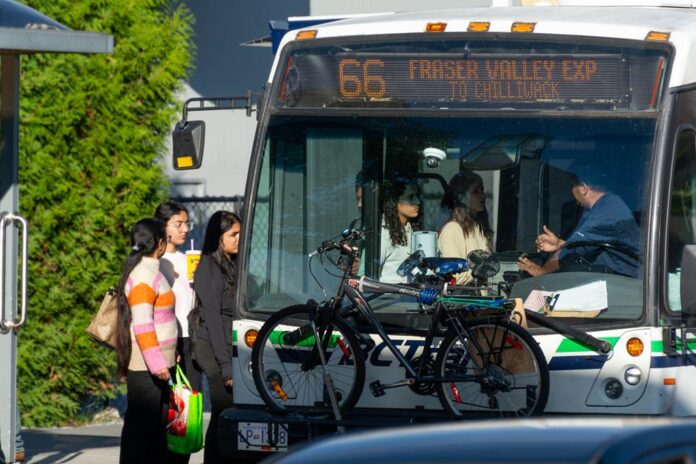Amid the futile negotiations between the Student Union Society (SUS) and BC Transit regarding the Fraser Valley Express 66 (FVX66) service, concerned students urge SUS to consider alternative solutions. Despite the BC Transit news release on Aug. 20 stating they would be adding more trips to the FVX66, the overcrowding of the bus service remains an issue.
According to an article by the Fraser Valley Current, the lack of space for more transit riders directly impacts the ongoing negotiations between the SUS and BC Transit for a potential discount on the FVX66. In the article, Jayden Hovey, the president of SUS, commented that “it is the responsibility of decision makers to take the affordability concerns of post-secondary students seriously and make efforts to address barriers to education like transportation.” Hovey remarked that this issue is a “high priority to the students of UFV and would be a major step towards alleviating transportation pressures.”
Cameron Hauck, a frequent user of the FVX66 service and host of CIVL Radio’s “Cam The Man Show” and “I Live Here Now,” shared with The Cascade that “there needs to be some sort of solution with the overcrowding, and there needs to be more consistency.” Hauck said that he would arrive at the bus stop twenty minutes before the bus was scheduled to leave and that it would not arrive for an additional half an hour. He added that sometimes the bus would not show up, or the next bus was at total capacity.
The overcrowdedness is not the only issue. Hauck commented on the costs of the service and said that “not everybody can afford a hundred dollars to get [the 30-day pass].” Hauck mentioned the situation’s unfairness, concluding that “there needs to be some sort of compromise.” Currently, the fare for a single ride is 5 CAD, and the 30-day pass costs 100 CAD. With no resolution yet to the continuing negotiations, it remains a concern for UFV students dependent on both the U-Pass and the FVX pass.
Even with the possibility of opting out of the U-Pass, the restricted requirements force some students to pay an extra expense. Student Ryen Lavoie shared his experience with the The Cascade: “I don’t live anywhere near UFV and would not be able to access any of the resources it offers without having to go out of my way.” Lavoie also mentioned that “the FVX66 wasn’t covered, and it would be the only thing I could use that the U-Pass would give me access to.”
“Instead, I have to pay 100 dollars out of pocket monthly to get to the school,” said Lavoie. “As a low-income student, I really needed the ability to opt-out of programs I wouldn’t be able to use.” Despite the increased financial needs that Lavoie’s disabilities have brought him, when trying to opt-out, his request was denied for not meeting the criteria. “It was frustrating to find out that I couldn’t [opt-out] because I wasn’t significantly disabled, nor did I fit the other two criteria.”
Expanding opt-out criteria was one of Hovey’s presidential commitments. “A lot of my goals are targeted toward addressing affordability issues,” he said during the February 2024 Candidates Debate. “Adding Route 66 to the U-Pass will have a direct impact on the cost of transportation for students, and expanding opt-out eligibility for U-Pass will mean more money in the pockets for students who can’t benefit from the services of the U-Pass.” However, there has been no evidence of an expansion of opt-out eligibility since he has taken office.
As of the publication of this article, there are no further public updates from SUS on the subject. On Sept. 27, Hovey informed The Cascade, “I am in the process of putting together a press release that will be published in the next few working days that will contain information on our current projects including updates on the FVX66.”
The Cascade will provide updates as they become available.


